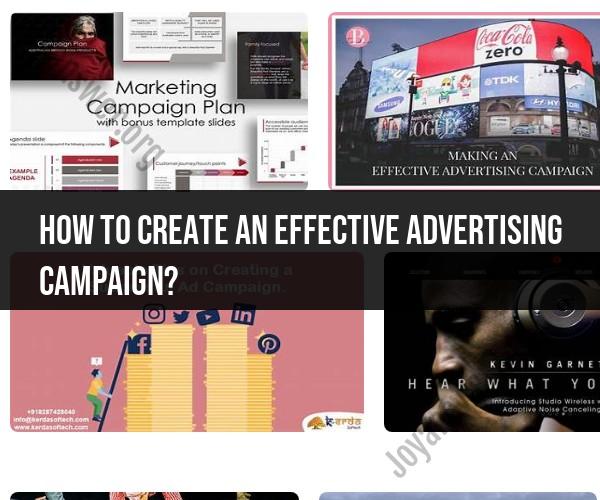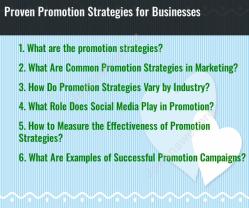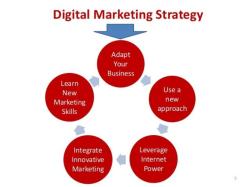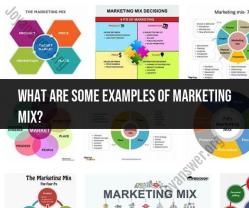How to create an effective advertising campaign?
Creating an effective advertising campaign involves careful planning, strategy, and execution. Whether you're promoting a product, service, or cause, here are some strategies and tips to help you create an impactful advertising campaign:
Define Clear Objectives:
- Start by identifying specific, measurable, and achievable goals for your campaign. What do you want to achieve? Increased sales, brand awareness, website visits, or customer engagement? Clear objectives will guide your campaign strategy.
Know Your Target Audience:
- Understand your target audience's demographics, preferences, needs, and pain points. Create buyer personas to help you tailor your message and choose the right advertising channels.
Develop a Unique Selling Proposition (USP):
- Highlight what sets your product, service, or cause apart from competitors. Your USP should resonate with your audience and address their needs or desires.
Choose the Right Advertising Channels:
- Select the channels that align with your target audience's behavior. Consider options like social media advertising, search engine marketing (SEM), email marketing, display ads, print media, television, radio, and more.
Create Compelling Creative Content:
- Design eye-catching visuals and craft persuasive ad copy that conveys your message effectively. Use storytelling and emotional appeals when appropriate to engage your audience.
Consistency is Key:
- Maintain consistent branding and messaging across all campaign materials and channels. This helps build brand recognition and trust.
Set a Realistic Budget:
- Determine a budget that aligns with your campaign goals. Consider factors like ad placement costs, creative production, and ongoing optimization.
Monitor and Measure Performance:
- Implement tracking mechanisms to measure the effectiveness of your campaign. Monitor key performance indicators (KPIs) such as click-through rates, conversion rates, and return on investment (ROI).
Optimize Continuously:
- Analyze campaign data and make adjustments as needed. A/B testing different ad variations, headlines, images, and targeting options can help improve performance.
Adapt to Trends and Feedback:
- Stay updated with industry trends and consumer feedback. Be prepared to adapt your campaign strategy to address changing preferences and market dynamics.
Utilize Call to Action (CTA):
- Include a clear and compelling CTA in your ads. Encourage viewers to take specific actions, such as making a purchase, signing up for a newsletter, or requesting more information.
Leverage Social Proof:
- Showcase customer reviews, testimonials, or endorsements to build trust and credibility.
Timing Matters:
- Consider the timing of your campaign. Seasonal or timely promotions can have a significant impact on results.
Geo-Targeting:
- If applicable, use geo-targeting to reach audiences in specific geographic locations. This is especially useful for local businesses.
Ad Compliance:
- Ensure that your advertising complies with relevant laws, regulations, and advertising guidelines.
Evaluate and Learn:
- After the campaign concludes, conduct a thorough evaluation to assess what worked and what didn't. Use these insights to inform future campaigns.
Seek Professional Help:
- If you're unsure about creating and managing an advertising campaign, consider working with advertising professionals or agencies who specialize in campaign strategy and execution.
Remember that effective advertising campaigns often require testing, refinement, and ongoing optimization. By carefully planning, targeting the right audience, and continuously improving your approach, you can increase the chances of achieving your campaign objectives.
Crafting an Effective Advertising Campaign: A Comprehensive Guide
Crafting an effective advertising campaign is a complex process that requires careful planning and execution. Here is a comprehensive guide to help you create a campaign that will achieve your desired results:
- Define your goals. What do you want to achieve with your advertising campaign? Do you want to increase brand awareness, generate leads, or drive sales? Once you know your goals, you can tailor your campaign accordingly.
- Identify your target audience. Who are you trying to reach with your advertising? The more specific you can be, the better. Consider factors such as demographics, interests, and behaviors.
- Develop a creative concept. This is the big idea that will capture your audience's attention and communicate your message. It should be original, relevant, and memorable.
- Choose the right media channels. Where will your target audience be most likely to see your ads? Consider traditional media channels such as TV, radio, and print, as well as digital channels such as social media, search engines, and display advertising.
- Set a budget and timeline. How much money do you have to spend on your campaign? How long do you want it to run? Once you have a budget and timeline in place, you can start to develop your specific ad campaigns.
- Create compelling ad copy and visuals. Your ad copy should be clear, concise, and persuasive. Your visuals should be eye-catching and relevant to your message.
- Test and optimize your campaigns. Once your campaigns are up and running, it's important to track their performance and make adjustments as needed. This will help you to ensure that your campaigns are as effective as possible.
Key Steps and Strategies for Creating Impactful Advertising
Here are some key steps and strategies for creating impactful advertising:
- Start with a strong foundation. This means having a clear understanding of your target audience, your brand messaging, and your campaign goals.
- Be creative and original. Don't be afraid to think outside the box and try new things. The most effective advertising is often the most unexpected.
- Be authentic. People can spot a fake from a mile away. Be genuine and honest in your advertising, and people will be more likely to trust you.
- Be data-driven. Use data to inform your creative decisions and to track the performance of your campaigns. This will help you to improve your results over time.
Maximizing the Impact of Your Advertising Campaign
There are a number of things you can do to maximize the impact of your advertising campaign:
- Use multiple channels. Don't put all your eggs in one basket. Use a variety of channels to reach your target audience.
- Target your ads. The more targeted your ads are, the more likely they are to resonate with your audience.
- Use compelling visuals. Visuals are more likely to grab attention and be remembered than text alone.
- Make it easy to respond. Tell people what you want them to do after seeing your ad, and make it easy for them to do it.
- Track and measure your results. It's important to track the performance of your campaigns so that you can see what's working and what's not. This will help you to improve your results over time.
By following these tips, you can create an effective advertising campaign that will help you to achieve your business goals.











